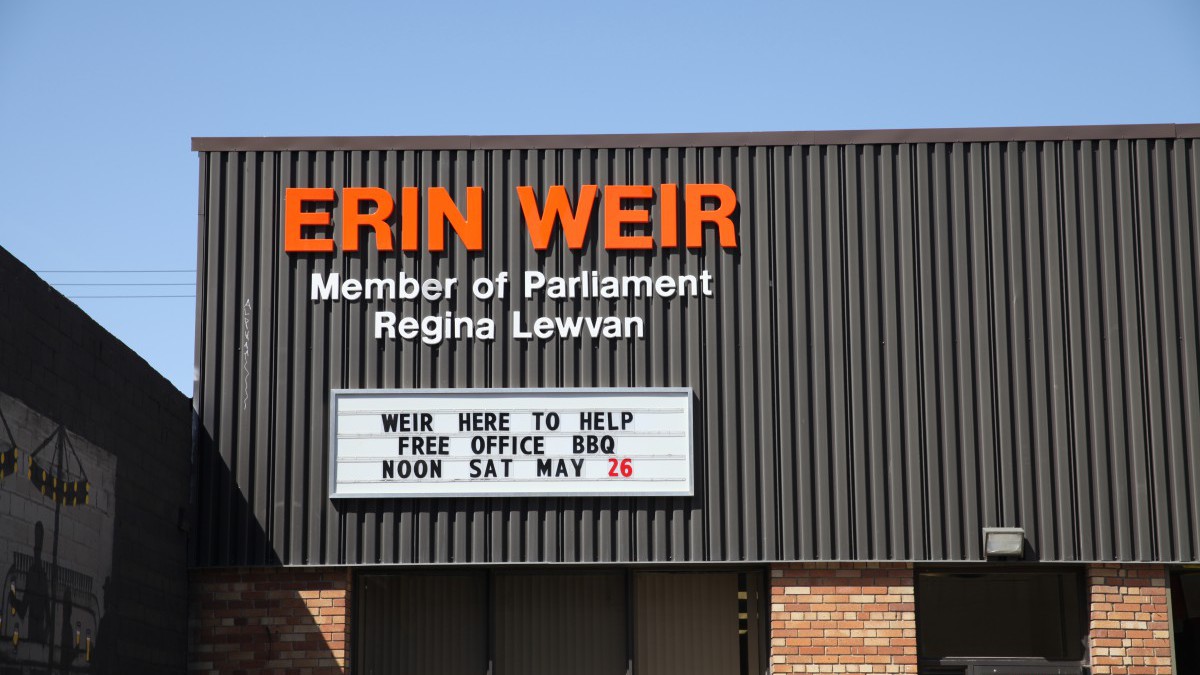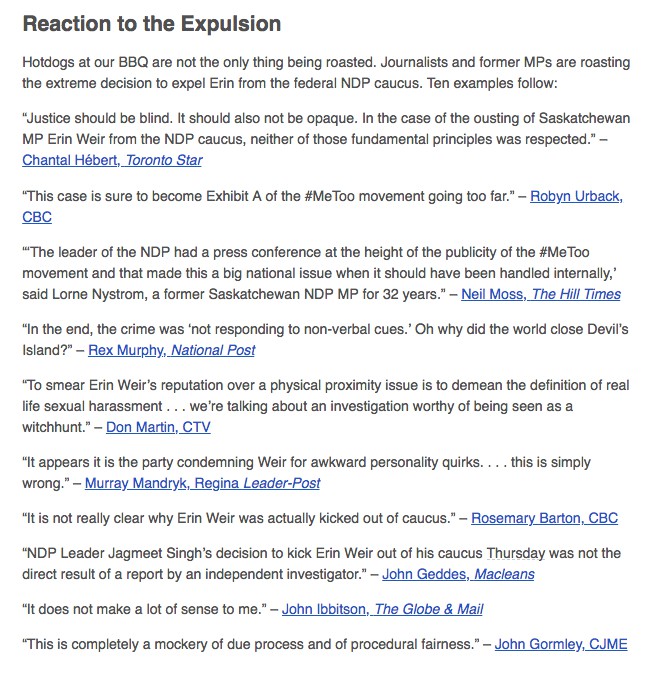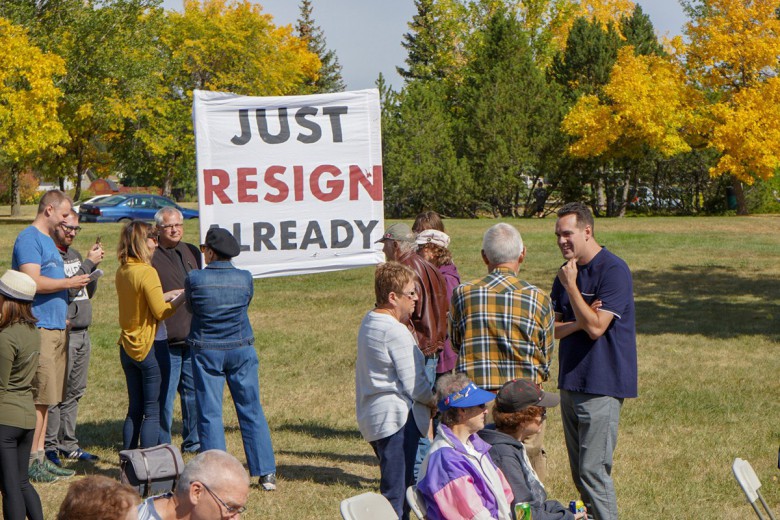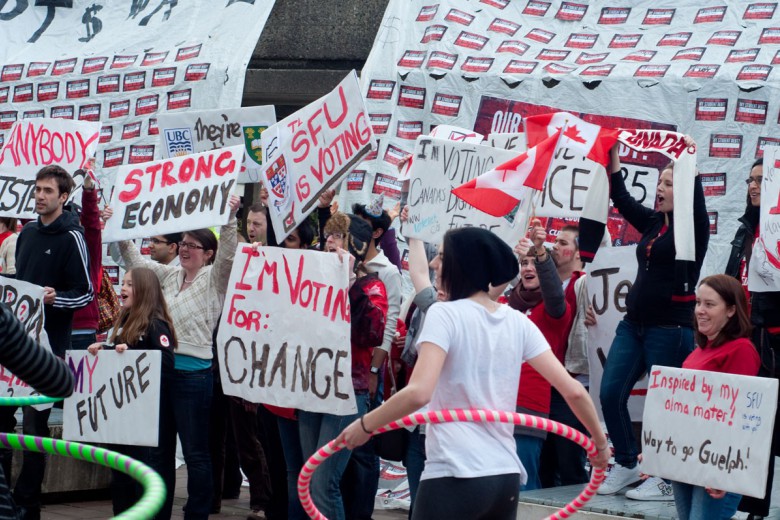We’ve met a couple times around Regina. We don’t know each other well, but in recent weeks I’ve watched your departure from the NDP, your TV appearances, and then the recent email to your supporters.
I feel compelled to address some of what you’ve said, and to try offer some insights to you, and to men in similar situations. Too often men remain quiet as their peers are accused of assault or harassment; it’s time we started demanding each other do better.
You know the basics, but they bear repeating. There are three claims of sexual harassment and one claim of harassment against you. It’s not an easy or trivial thing to allege (sexual) harassment – especially given the fact that those who do come forward (mostly women) are almost always disbelieved and discredited, while (white) men are protected and forgiven.
Your “behaviour resulted in significant negative impacts to the complainants,” Jagmeet Singh read from a report by a third-party investigator, which has not yet been made public. The same report also found that once you were told your advances were unwanted, you stopped. In those moments, you were able to learn and change your behaviour.
But the last few weeks have inspired less confidence.

One complainant spoke to the CBC, which published a story on May 1 without identifying her name. In the same story, you furiously denied the allegation, all but outed the complainant by suggesting that her allegation was your punishment for speaking out on import/export carbon pricing adjustments, an issue the NDP was staying quiet on.
By calling the allegations a “trumped-up harassment complaint” aimed to “shut down democratic debate” you’re effectively dog-whistling to those who seek to blame women for their own experiences of harassment. By quoting right-wing pundits attacking the #MeToo movement in an email to supporters, you’re spurring on those who would characterize the widespread outings of abusive men as “witch hunts.” This case is not just about you – it’s about feeding into a system that silences and punishes women for coming forward.
After going on the offensive on May 1, you did, for a while, rein yourself in when asked to. But once Jagmeet Singh expelled you from the NDP caucus late the next day, you went back on the offensive – calling the investigation “deeply flawed,” saying that you should be reinstated as an NDP caucus member, and saying that your behaviour was “far from what most Canadians would think of as harassment.”
Defensiveness is a standard response in these situations. But I’m asking you – and other men facing allegations of harassment – to respond with patience and good faith instead. Remember that accountability processes, like the one you find yourself in the midst of, aim to ensure safety of the complainants and prevent further harm.
Accountability processes, when they actually happen, tend to be slow. And communities are littered with abandoned accountability processes that men have destroyed with impatience, not allowing for the time and space those they’ve hurt may need.
This case is not just about you – it’s about feeding into a system that silences and punishes women for coming forward.
In the House of Commons, when someone makes an argument against you, Members of Parliament respond immediately. But allegations of sexual harassment cannot be treated like a political debate, because they don’t happen on an even playing field. Women who allege harassment have nearly always been disbelieved – dragged through the mud, victim-blamed, or simply ignored. Now, as we try to undo generations of silencing and sexism, men need to respond to allegations of harrassment differently. Slinging accusations and outing complainants increases the hostility of the situation and makes it more difficult for women to share their experiences. It forces women to choose between turning their painful experiences into material for public debate (on your terms), or being dismissed. It shifts attention to you playing the victim, instead of you listening to allegations, reflecting on your actions, and waiting for the process to address the full picture of your behaviour and its effects.
But, facing multiple allegations of harassment that have not been addressed through any sort of restorative justice or rehabilitative process, you had the audacity to claim to be resurrecting the Co-operative Commonwealth Federation (CCF), the precursor to the NDP. Let’s hope much has changed since the heyday of the CCF in the mid-1900s, when society tossed aside women who came forward with harassment allegations.
Instead of doubling down, you could have said you were doing some reflection and personal work, that you resolve to support survivors, that you hope the NDP leadership will craft a process that makes for a safer workplace environment, and that you will be willing at any time to engage in that process respectfully. The men in your life should be helping you, keeping an eye on your behaviour, to work with you to correct it if and when you cross boundaries with people.
It’s too late to undo the existing damage. But it’s not too late to change course, to reframe the conversation for yourself and for the public. To listen and to believe women. As a political leader, and as a community leader, if you don’t do this, what are you doing?
This story has been updated to reflect the fact that Weir called the allegation of harrassment “politically motivated” on February 1, not March 1.









